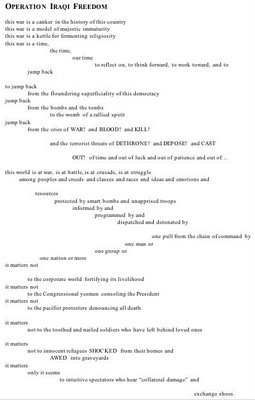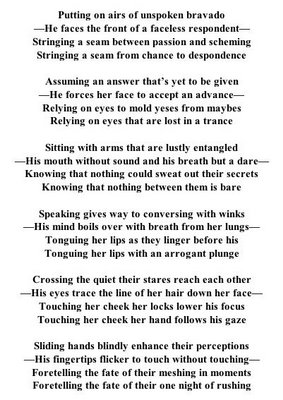I wrote this I guess probably about a year and a half ago. It's a speech/lecture/presentation I created to give to one of my classes. I never gave it. Because, in part, it over-does the drama and under-does the truth. But I think it has something to offer. And there's a line in there about an epidemiology of ideas that I like.
I was reminded of this speech by something I said a few days ago. Over-dramatic and under-truthed advice to med students: 50% of what you learn here will be wrong in 4 years...The trouble is, no one knows which 50%.
I'm not in med school. But that advice seems more true, somehow, out and about. If only because this piece extends that advice beyond med school, I like it.
******
Several of you have asked me recently why you’ve been learning for two years that the “so what” of your papers should come in the conclusion, only now to be taught that it should be introduced from the outset and incorporated throughout.
Well. The answer is simple: it’s complicated.
Each of us, in many ways and each of us in our own ways, are resistant to growth. Which does not make us unmotivated or apathetic, or even at all abnormal. Although it does make us somewhat obstinate.
But it makes sense, I think. Growth is difficult. Especially when it feels like it’s happening quickly, or when it feels forced upon you. Both of which are feelings that abound during high school. I remember that. I get that.
But let me tell you, as one who is just enough more experienced than you, it doesn’t get easier. It continues to feel forced sometimes, and it seems to happen more quickly, if you can imagine. In that way it gets more difficult. Though you come to expect it, and eventually, to accept it. And more slowly, usually, to embrace it.
And so your obstinacy, our obstinacy, is understandable. But still regrettable. And ultimately it cannot, it will not, hold up.
We have to grow. It’s not a choice. Especially not in today’s world, where what you learned yesterday often no longer holds true tomorrow.
A professor of mine at Brown, Professor Beiser, was fond of telling us, a large but discussion-based philosophy class, that students are often told on their first day of medical school, “Fifty percent of everything you learn here will be completely wrong when you graduate in 4 years…the trouble is, no one knows which fifty percent.”
He was right. He is right. No one knows which fifty percent. No one knows what will be obsolete tomorrow or next week or next year or 5 years from now when you graduate college and enter that elusive arena known only as “the real world.”
He often ended class with that statement. No one knows which fifty percent.
The message was clear. It didn’t just apply to med school, where the application was obvious and often physical.
Viruses mutate. New medicines are developed. Vaccines are created. New methods of surgery are invented and put into practice. And all of this can be traced via epidemiology.
But Professor Beiser was talking about something more. The mutation of problems. The development of new methods of action. The creation of new solutions. An epidemiology of ideas.
Albert Einstein once said, “The problems that exist in the world today cannot be solved by the level of thinking that created them.” This from a man, let us remember, whose theories and advocacy were instrumental in the development of the atomic bomb, the use of which Einstein always condemned.
What level of thinking brought us the atomic bomb?
E = mc2. The idea that energy and mass are relatively equivalent. The notion that an enormous amount of energy could be produced by, could be harnessed from, a tiny bit of mass. The imaginative theorizing it took to conceive of a chain reaction caused by splitting an atom, an iota of the universe, splitting that, a chain reaction that could destroy a modern city.
“The problems that exist in the world today cannot be solved by the level of thinking that created them.”
Change is constantly upon us. Yesterday’s means are forgotten. And yesterday’s ends are merely our starting point.
E = mc2. Discovery led to the opportunity for destruction. Which led to the opportunity for power and for warmth. Which led to the opportunity for terrorism. Which has led to the opportunity for a global response.
A response that no one really knew how to initiate.
A response that has begun to fall flat.
Or which has simply stripped off its global colors and reverted into yesteryear’s provincialism.
When E equaled mc2. And that was enough.
A global response. Which no one knows how to reinvigorate.
Because our leaders have reverted to yesterday’s means. Repackaged, perhaps. Our bombs apparently have greater intelligence now. Which means, I suppose, that they know when they destroy innocent lives.
“The problems that exist in the world today cannot be solved by the level of thinking that created them.”
“The release of atomic power,” Einstein also said, “has changed everything except our way of thinking.”
At the risk of sounding trite, it’s not our bombs that need greater intelligence to encounter the problems of today and tomorrow. It’s us. We must grow. Beyond E = mc2. Up and upward. Outward and together. We must grow forward as time moves forward.
We must continue to learn as quickly as we discover we are wrong. Life today is, it must be, a continual process of acceptance and adaptation and discovery.
Answers are inherently elusive and essentially transitory. Life today must be fueled by questions. How? Why? So what?
And so, in the interest of such eternal cycles, we too have in this space today come full circle. The question we started with: Why, it’s been asked, are we learning to incorporate our “so whats” throughout our papers?
Because you must grow as the world around you grows.
Because your writing should mirror life. The time has come and gone for the process of offering an idea, offering evidence in support, and then explaining why it was important at the end.
Discovery is no longer slow enough to allow you to hint at significance in conclusion.
Charles Darwin published On the Origin of Species in 1859, proposing that the creatures currently inhabiting Earth had descended from the first life on the planet in a continuous process of variation and natural selection. The third to last paragraph of this groundbreaking work ends with the simple line, “Light will be thrown on the origin of man and his history.”
Almost 150 years later, there is no longer time for such understatement.
James Watson and Francis Crick published an unassuming one-page paper in Nature magazine in April of 1953. The paper was titled, “A Structure for Deoxyribose Nucleic Acid.” The structure of DNA, the biochemical backbone of Darwin’s theory, had been exposed. The paper concludes, “It has not escaped our notice that the specific pairing we have postulated immediately suggests a possible copying mechanism for the genetic material."
Over 50 years later, there is no longer time for such modesty.
Discovery is no longer slow enough to allow you to hint at significance in conclusion. You must have a good grasp, and your reader must have a good grasp, on the significance of what you’re saying as you are saying it.
Because by the time you get to the end, you’ll need to be asking new questions.
Darwin took twelve years before he published The Descent of Man in 1871, in which he applied the theories from On the Origin of Species directly to the question of human evolution. Twelve years.
You can’t wait twelve years. “So what” has become day by day. And so it must, to make it concrete, become paragraph by paragraph. You can’t wait twelve paragraphs to suggest the significance of what you’re saying.
Conclusions are where you pound home the “so what” that you have worked to describe and to demonstrate gradually. And then, today, the conclusion is where you ask, “what’s next?”
Darwin ended On the Origin of Species with a passage that seems fitting as an ending here as well, though I will shorten it and must acknowledge twisting it for my own devices.
“Judging from the past,” Darwin writes, “we may safely infer that not one living species will transmit its unaltered likeness to a distant futurity. And of the species now living very few will transmit progeny of any kind to a far distant futurity; for…the greater number of species…have left no descendants, but have become utterly extinct.”
There’s a bit more, but, first, in a slanted take on “what’s next,” I offer you here Professor Beiser’s reminder: No one knows which fifty percent.
“There is grandeur in this view of life,” Darwin continues, and I offer as a more hopeful outlook, “…whilst this planet has gone cycling on according to the fixed law of gravity, from so simple a beginning endless forms most beautiful and most wonderful have been, and are being, evolved.”

























